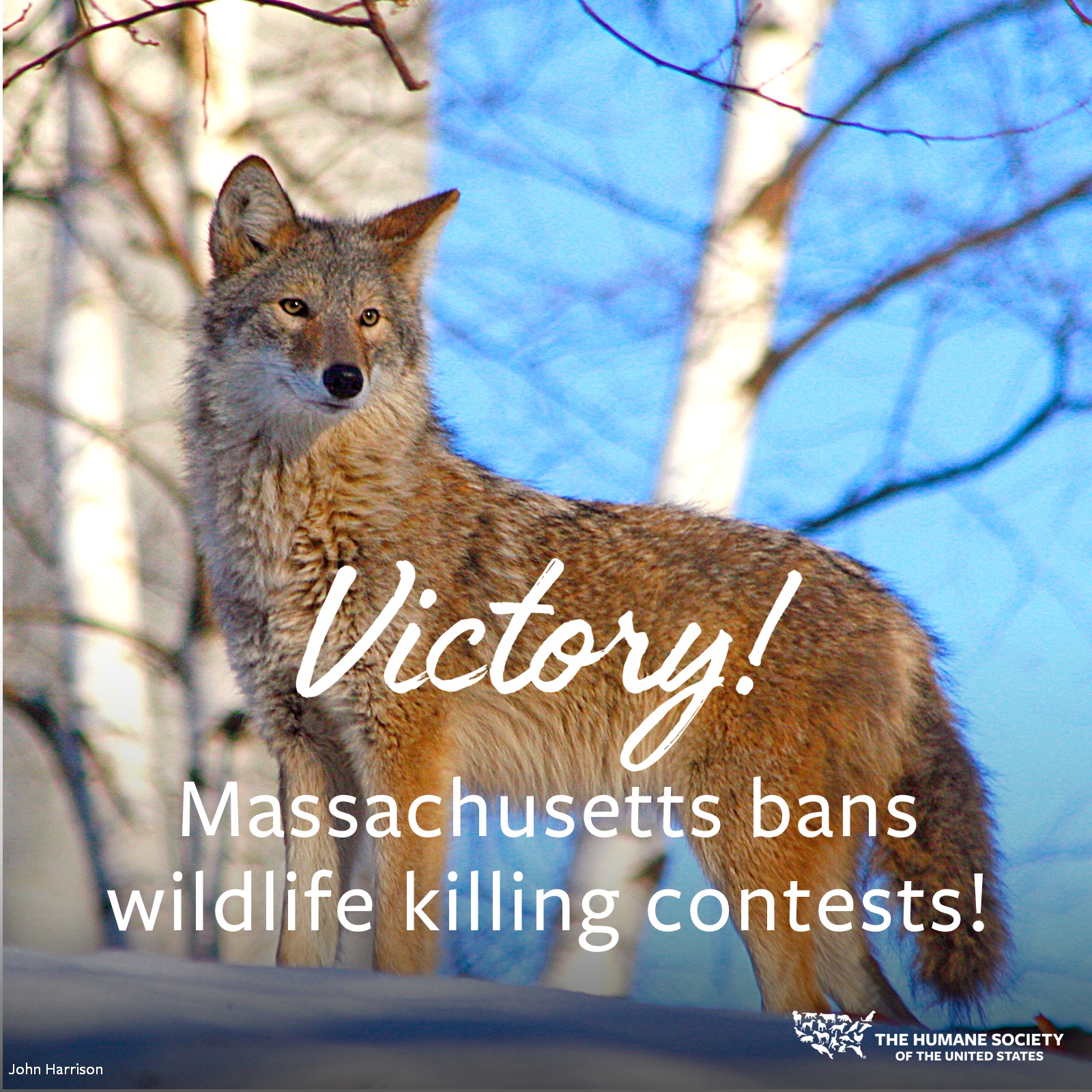Massachusetts bans wildlife killing contests
With a historic vote just now by its Fisheries and Wildlife Board, Massachusetts has become the fifth U.S. state to ban cruel, gruesome, and unsporting wildlife killing contests!
For Immediate Release: December 18, 2019
Massachusetts outlaws destructive
wildlife killing contests
Regulation abolishes competitive killing of wild animals for prizes and entertainment
Boston, MA – A coalition of leading wildlife protection organizations is applauding MassWildlife staff and the Massachusetts Fisheries and Wildlife Board for their vote today to ban wildlife killing contests in the Commonwealth.
The vote will bring an end to events like the ones recently held on Cape Cod and in Granby, in which participants competed to kill the largest, smallest, or the greatest number of animals for cash and prizes. Winners of wildlife killing contests often proudly post photos and videos on social media that show them posing with piles of dead animals, often before disposing of the animals in “carcass dumps” away from the public eye. When proposing this ban in July 2019, the Massachusetts Division of Fisheries and Wildlife noted growing outrage in Massachusetts about these cruel and unethical contests.
“Upon learning about these unsporting contests, Massachusetts citizens made it clear that they would not tolerate these killing competitions in their state, contacting MassWildlife by the hundreds to voice their opposition,” said Elizabeth Magner, Ph.D., animal advocacy specialist for the Massachusetts Society for the Prevention of Cruelty to Animals (MSPCA). “The MSPCA is grateful that MassWildlife staff and the Fisheries and Wildlife Board treated this matter with the seriousness that it warrants, and for positioning Massachusetts as a national leader on this issue.”
“Wildlife killing contests are a bloodsport just like dogfighting and cockfighting, which have been outlawed nationwide” said Katie Stennes, programs and communications manager for Project Coyote. “We commend the Massachusetts Fisheries and Wildlife Board for relegating these ecologically and ethically indefensible events to the history books.”
“Wild animals play an important role in their ecosystem and our environment,” said Stephanie Harris, senior legislative affairs manager for the Animal Legal Defense Fund. “The forward-thinking, science-based regulations adopted by MassWildlife and the Fisheries and Wildlife Board to prohibit senseless killing contests and wanton waste are among the nation’s strongest.
“Participants of wildlife killing contests often use unsporting and cruel techniques – such as calling devices that mimic the sound of prey or even pups in distress – so that they can lure shy coyotes and foxes to shoot at close range,” said Laura Hagen, Massachusetts state director for the Humane Society of the United States. “We thank MassWildlife for taking decisive action to ensure that the Commonwealth no longer supports such barbaric and wasteful killing of its treasured wildlife.”
Wildlife agencies and professionals across the country have expressed concerns about killing contests not only because they reflect badly on responsible sportsmen and sportswomen, but because they also contravene modern, science-based wildlife management principles. In 2018, more than 70 renowned conservation scientists issued a statement citing peer-reviewed science that refutes claims that indiscriminately killing coyotes permanently limits coyote populations, increases the number of deer or other game species for hunters, or reduces conflicts with humans, pets or livestock. In fact, by disrupting coyote pack structure, randomly shooting coyotes may increase their populations and lead to more conflicts. Nonlethal, preventive measures are most effective at reducing conflicts with wildlife.
Wildlife killing contests are also destructive to healthy ecosystems, within which all wildlife species play a crucial role. Coyotes and foxes in particular provide a range of ecosystem benefits, including controlling rabbit and rodent populations and restricting rodent- and tick-borne disease transmission.
In just the past five years, California, Vermont, New Mexico and Arizona have taken a stand against cruel, unsporting and wasteful wildlife killing contests. California banned the awarding of prizes for killing furbearing and nongame mammals in 2014; New Mexico and Vermont outlawed coyote killing contests in 2019 and 2018, respectively; and Arizona prohibited the events for predatory and furbearing species this year.
# # #
Founded in 1954, the Humane Society of the United States and its affiliates around the globe fight the big fights to end suffering for all animals. Together with millions of supporters, the HSUS takes on puppy mills, factory farms, trophy hunts, animal testing and other cruel industries, and together with its affiliates, rescues and provides direct care for over 100,000 animals every year. The HSUS works on reforming corporate policy, improving and enforcing laws and elevating public awareness on animal issues. More at humanesociety.org.
Project Coyote, a national non-profit organization, is a North American coalition of scientists, educators, ranchers, and citizen leaders promoting compassionate conservation and coexistence between people and wildlife through education, science and advocacy. Visit ProjectCoyote.org for more information.
About the Animal Legal Defense Fund – Forty years of fighting for animals: The Animal Legal Defense Fund was founded in 1979 to protect the lives and advance the interests of animals through the legal system. To accomplish this mission, the Animal Legal Defense Fund files high-impact lawsuits to protect animals from harm; provides free legal assistance and training to prosecutors to assure that animal abusers are punished for their crimes; supports tough animal protection legislation and fights harmful legislation; and provides resources and opportunities to law students and professionals to advance the emerging field of animal law. For more information, please visit aldf.org.
The mission of the MSPCA-Angell is to protect animals, relieve their suffering, advance their health and welfare, prevent cruelty, and work for a just and compassionate society. Founded in 1868, the MSPCA-Angell is the second-oldest humane society in the United States. The organization’s public policy work is essential to bringing about long-term change for animals, with the MSPCA working locally and nationally to improve animal protection laws and regulations. This work is sustained through volunteer Animal Action Team members, who engage in advocacy both in their municipalities and on the state level to improve the lives of animals. Learn more at mspca.org.



